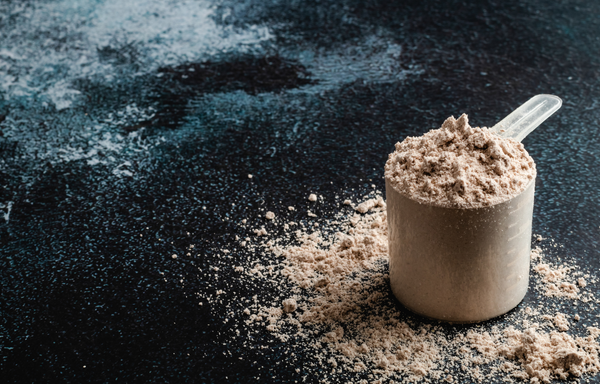

The Hidden Dangers of Whey Protein
Why Whey Protein Spikes Insulin and What to Choose Instead
Whey protein is everywhere in the fitness and health industry, promoted for muscle growth and recovery. But if you are managing high insulin levels or conditions like PCOS, it is important to understand how whey protein affects your body. Studies show that whey can spike insulin levels even higher than white bread, making it a poor choice for many people trying to follow a Low Insulin Lifestyle.
Why Does Whey Protein Raise Insulin?
Whey protein exists in milk for a reason—it is designed to promote rapid growth in newborns. Milk naturally contains insulin and insulin-like growth factor 1 (IGF-1) to help babies grow quickly. When whey is separated from casein during cheese and yogurt production, it retains much of the naturally present insulin and IGF-1.
But that is not the only reason whey spikes insulin. Whey is packed with branched-chain amino acids (BCAAs), which directly stimulate insulin release. While BCAAs are essential for muscle growth, consuming too much can lead to chronically high insulin levels and contribute to insulin resistance over time.
A quick online search will show studies promoting whey protein as a way to force the pancreas to release more insulin to lower blood sugar in people with type 2 diabetes. The problem with this approach is that it only focuses on short-term blood sugar control while ignoring the long-term damage caused by excessive insulin secretion. Over time, chronic high insulin can lead to insulin resistance, increasing the risk of diabetes, heart disease, and even certain cancers.
Isn’t Whey Protein Considered Healthy?
Many fitness enthusiasts swear by whey protein, but that does not mean it is good for everyone. People metabolize food differently, and while some bodybuilders remain lean despite consuming whey, others do not. Even someone who looks fit may not be metabolically healthy. Some people stay lean because they do not produce much insulin, which makes fat storage more difficult for them.
Athletes often time their whey protein intake around workouts because insulin spikes help shuttle nutrients into muscle cells for recovery and growth. But for the average person, especially someone doing low-impact exercise like walking, consuming whey protein can lead to unnecessary insulin spikes without any real benefit.
Even for those who lift weights, whey protein is not necessary to stimulate insulin for muscle growth. Whole food proteins provide the same benefits with a slower, more natural insulin response that does not overwhelm the body.
Why Is Whey Protein in Everything?
Whey protein was once considered a waste product from cheese and yogurt production. Instead of throwing it away, manufacturers found a way to market it as a high-value supplement. Now, whey protein is added to all kinds of processed foods, from protein bars to cereals, as a way to justify higher prices and appeal to health-conscious consumers.
This marketing strategy may be great for the food industry, but it is not great for the 89% of people with high insulin levels, including the 20% of reproductive-age women with PCOS. Both groups should be cautious about consuming whey protein because of its strong insulin-spiking effects.
Better Alternatives to Whey Protein
If you rely on protein powder, there are better options that will not spike insulin as much:
- Egg White Protein – A high-quality protein source without the insulin spikes of whey.
- Bone Broth Protein – A complete protein that supports muscle repair without overstimulating insulin.
For the best results, focus on whole food protein sources that do not need a label. Meat, poultry, fish, eggs, nuts, and seeds are all excellent choices. For those following a vegetarian or vegan diet, minimally processed soy foods like tofu or edamame, lupini beans (a non-starchy bean), along with a variety of nuts and seeds, provide a balanced protein intake.
The Bottom Line
Whey protein is marketed as a health food, but for those managing insulin resistance or PCOS, it can do more harm than good. Understanding how whey affects insulin and recognizing its presence in processed foods can help you make better dietary choices. Choosing whole food protein sources or insulin-friendly protein powders can support better metabolic health and help keep insulin levels in check.
References
- Salehi A, et al. The insulinogenic effect of whey protein is partially mediated by a direct effect of amino acids and GIP on β-cells. Nutr Metab (Lond). 2012. Read more
- Almario RU, et al. Glucose-lowering effect of whey protein depends upon clinical characteristics of patients with type 2 diabetes. BMJ Open Diabetes Res Care. 2017. Read more
- Nouri M, et al. A systematic review of whey protein supplementation effects on human glycemic control: A mechanistic insight. Diabetes Metab Syndr. 2022. Read more






















